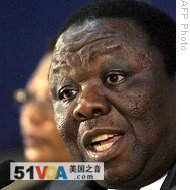Harare
30 January 2009
Zimbabwe's Prime Minister designate, Morgan Tsvangirai will lead his party, the Movement for Democratic Change, into a unity government with President Robert Mugabe's ZANU-PF. The MDC's top executives had earlier unanimously approved the decision, needing only a formal ratification from the party's national council.
 |
| MDC leader Morgan Tsvangirai (file) |
Mr. Tsvangirai and his executives still have many reservations about going into a unity government with ZANU-PF. But Mr. Tsvangirai said the time had come to put the people of Zimbabwe first.
The MDC decision-making meeting was held at the MDC's Harare headquarters. Many party supporters who are also members of parliament, senators and councilors attended.
When Mr. Tsvangirai emerged from the meeting, a crowd of several hundred surged forward in one of the biggest spontaneous demonstrations seen in Harare for many years. When he told the crowd he was going into the government they shouted support and sang in jubilation.
The riot police, for so long at the forefront of violently breaking up demonstrations, passed by in their truck and all of them smiled and the enormous crowd responded by cheering them past.
Earlier in the day, a so-called Joint Monitoring Committee, made up of four representatives each of the three parties, was formed to manage any disputes that might emerge in the unity government.
If the committee is unable to do so, the issue will be referred to the guarantors of the unity government, SADC and the African Union.
The committee met this morning for the first time at the South African embassy.
All sides admit that there are many existing problems and more are likely to follow. Mr. Tsvangirai told his national council that at the top of his list of concerns is the continued detention by the police of more than 30 party members, a human rights campaigner and a photojournalist. Most were abducted from their homes in December and continue to fight for their freedom in the courts.
It is likely that this will be one of the first issues the committee will have to deal with.
A second issue is the ongoing eviction of farmers from their land. A group of several of the few hundred remaining white farmers in central Zimbabwe were warned Thursday that they would be violently evicted from their properties in the next few days because a unity government was imminent.
A constitutional amendment to legally constitute the unity government is next on the political calendar. Mr. Tsvangirai will be sworn in on February 11 as prime minister, along with his two deputies and members of the cabinet. All of this must be completed by mid-February, or earlier, in order to comply with the SADC resolution instructing the parties to set up the unity government.
On Thursday Mr. Tsvangirai visited U.S. ambassador to Zimbabwe James McGee to tell him of the party's decision and to ask the U.S. government to support the new government in reconstructing the damage inflicted by decades of poor administration by Mr. Mugabe and his government.